A Fair New Idea?!
We lanceerden vier open oproepen voor projectvoorstellen die bijdragen aan een sterk, eerlijk en duurzaam kunstveld. Bekijk de resultaten en ontwikkelingen.
(crosspost from https://zoiahorn.anarchaserver.org/a-fair-new-idea-a-feminist-video-streaming-platform/)
Between late 2021 and late 2022, systerserver, anarchaserver and leverburns sysadmins installed, maintained and provided an instance of the open source software PeerTube; an online video and streaming platform.
The platform hosted two online video residencies, and streamed and archived feminist related events and panels. During this period the feminist servers’ sysadmins organized various workshops for installing and upgrading online tools such as backups, monitoring and other services.
In this blog entry you can find a summary of all activities that happened during the mentioned period, organized by the following themes: Workshops, Panel, Residencies, Streaming/archiving, Interviews.
The Peertube install happened in three whole-day sessions. These hands-on sessions required access to the server and included preparation study, collaborative research, skill-sharing, bug-fixing and real-time note taking.
Following the installation guide provided by Peertube docs, we managed to install our Peertube instance and configure its functions and features. Our online gatherings happened in a video call. We worked collaboratively on our server, using the tool “tmux”, which allows simultaneous access to terminal sessions. We used the Etherpad instances of vedetas and leverburns for collective note-taking. Afterwards, we dedicated some extra time to properly documenting our process at our Gitlab instance. We wrote down the technical steps we followed, together with reflections on the challenges we encountered (Internal gitlab ticket).
When: Tuesdays 12, 19 and Friday 29 October 2021 (10:00 to 17:00)
Where: Online sessions in the Jitsi instance hosted by FuturÉtic.
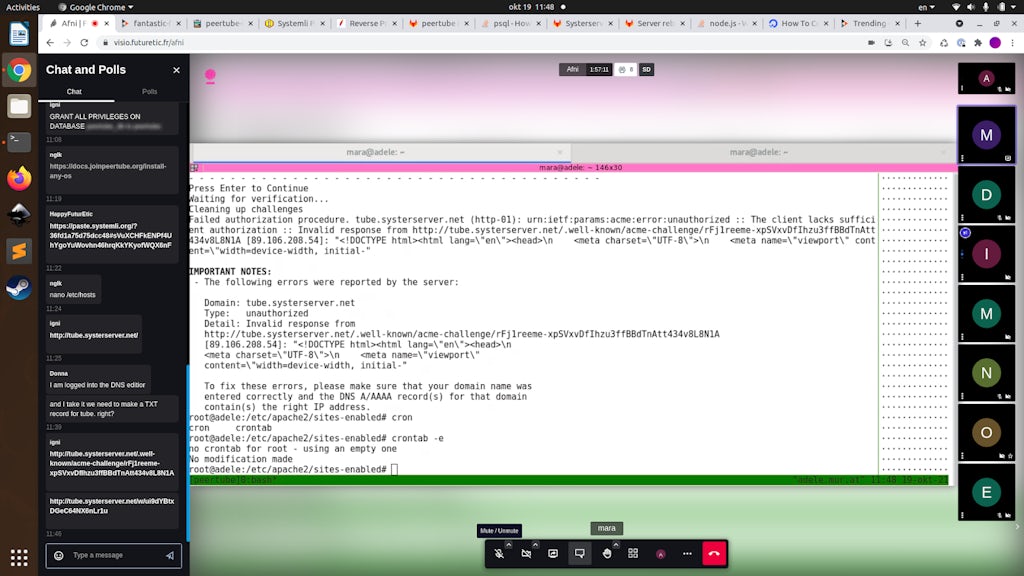
During two days, we worked on creating periodic backups for systerserver to lever burns (S14 machine). We installed Borg Backup and created a script to automate the process. (Internal Gitlab ticket)
When: Monday 29 and Tuesday 30 November 2021 (10:00 to 17:00)
Where: Physical meetings in Rotterdam
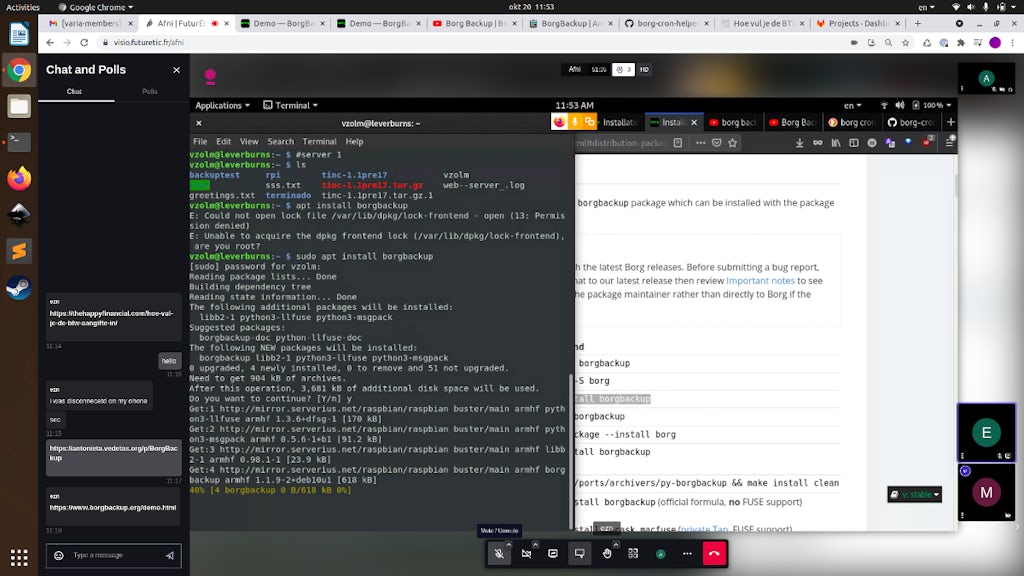
Skillsharing workshop on how to set up Passwordstore, a group password manager using “pass”, a unix password manager for the command line. During the meeting we collectively installed passwordstore, and created a repository to keep track of our secrets encrypted with our gpg keys. We called the repo systersecrets (Internal Gitlab ticket)
When: Monday 1 November 2021 (19:00 to 22:00)
Where: Online meeting in the Jitsi instance hosted by Autistici.
Session on installing Prometheus -a free software application used for systems monitoring and alerting- on systerserver. (Internal Gitlab ticket)
When: Friday 3 June 2022 (11:00 to 15:00)
Where: Online meeting in the Jitsi instance hosted by FuturÉtic.
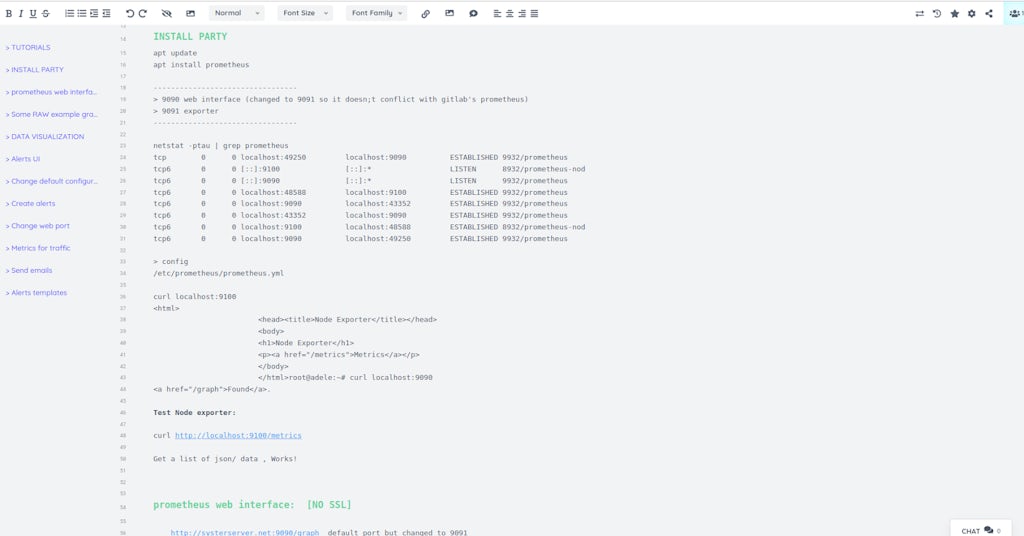
We organized two days of workshops:
A CSS styling workshop for our Peertube instance. We created a visual style inspired by the non-binary colour palette and published it as an npm package. It can be downloaded and installed from the npm package. Or from our gitlab repository
A howto workshop about the steps and challenges we faced during the installation of our peertube instance. We shared the context of why we opted to install a peertube instance on systerserver. We went trough the documentation of how we installed and styled peertube and the technical challenges we encountered. We tested together how to create accounts and upload small videos of our local/remote experience. We collected the participants’ feedback / questions which support us to articulate a feminist data policy on our terms and code of conduct.
When: 28 and 29 December 2021
Where: Physically in Bologna and online via the Big Blue Button instance of CCC.
This session at Privacy Camp advocated for a feminist internet and the need to empower our communities, working with technologies to do so. Communities of artists and activists lack the structural resources to enable feminist hosting platforms to become sustainable in the longer term. The speakers elaborated on the urgency of technofeminist infrastructures in relation to the wider context of digital rights and addressed the challenges their mission entails in relation to an internal and external agency. Read the summary at the privacy camp blog
Speakers:
Moderators:
Privacy camp panel committee:
Panel questions:
Key points:
M Knodel pointed out that feminism speaks to a variety of different interpretations (e.g., social justice, human rights, democracy). Feminism helps us to look at different conceptions, such as bodily issues which go beyond human rights issues. Technofeminist infrastructures are inclusive to the needs of diverse groups. M Falzoni gave the example of Latin-American organizations, many activists are at risk of attacks by right-wing groups, sexist groups, and even governments. Hence, they need extremely secure tools to protect themselves and their work – which may be different from feminist groups in Europe. One of the most important needs that technofeminism deals with is building more sustainable and safe spaces. Small scale autonomous servers enable networks of trust, data protection, and an alternative to the data extraction practices of surveillance capitalism.
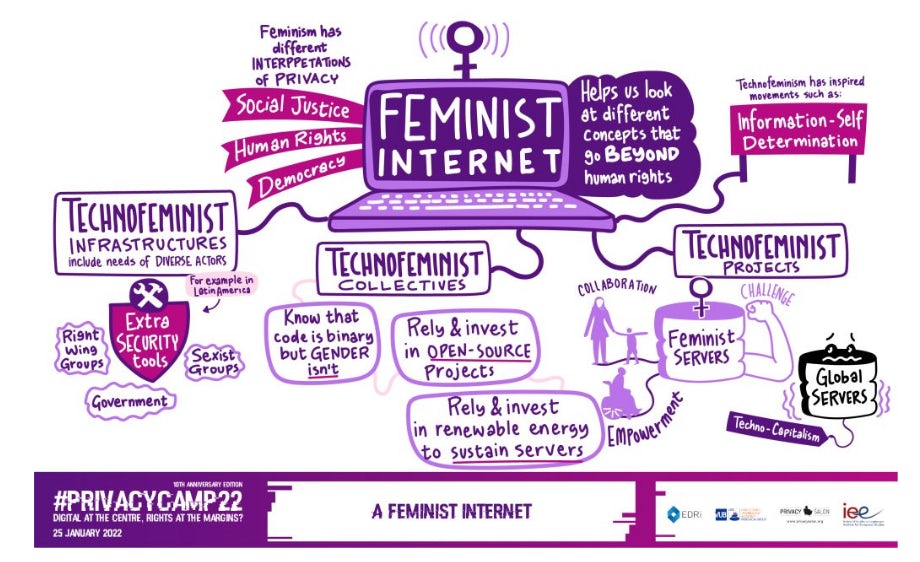
MELT (Ren Loren Britton & Isabel Paehr) study and experiment with shape-shifting processes as they meet technologies, sensory media and pedagogies in a warming world. Meltionary (derived from “dictionary”), is a growing collection of arts-design-research engagements that cooks up questions around material transformations alongside impulses from trans feminism and disability justice.
Melting as a kaleidoscope like phenomena touches upon multiple topics at once: climate change, the potential for political reformulations, change over time and material transformation. MELT shares work in the forms of videos, installations, websites, lectures, workshops and courses.
During the first residency, MELT created accessible videos as an introduction to their ACCESS SERVER project in sign language, and subtitled.
As a digital arts tool, ACCESS SERVER disrupts systematically ableist cultural institutions in Europe. The project is threefold: for disabled people, it offers email templates and 20€ per email to account for the labor of asking for access such as closed captions, alt texts, sign language and scent-free spaces. All emails routed through the server will link to the website in the footer, and automatically cite previous access requests to the same institution. For institutions, it provides information on how to make spaces, events and websites more accessible and how to respond to access requests. In events called ACCESS SPARKS non-disabled and disabled people can share and learn about access.
The video contributions can be watched here.
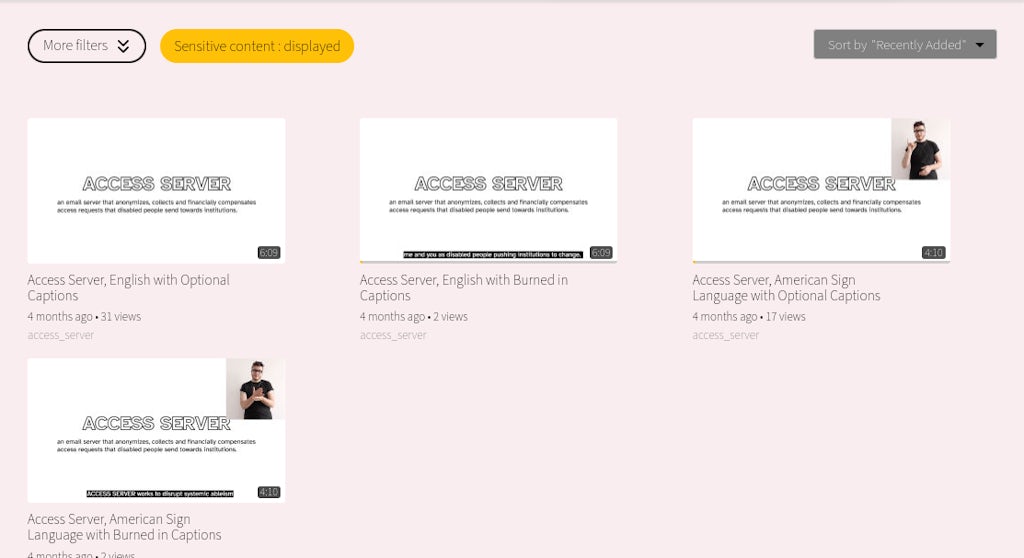
Golubjevaite (she/her) —- a text±sound artist and creative coder based in the Netherlands. Golubjevaite works with live digital/audiovisual performances and experiments with DIY non-linear interfaces. She seeks to create a bridge between language, autobiography and coding practices. She educate herself about code and digital technologies at her own pace and refuse the commodified masculine-imposed approaches to software development. Golubjevaite practices continuous prototyping with a goal to think about language-based tools that stimulate, empower, amplify women’s voices.
During the residency Golubjevaite took the time to learn more about command-line available tools to experiment with making scripts for audio-video production. More specifically she is also using these scripts to create short experimental language-based audiovisual works focusing on her interest fields >> non-linearity // genres of “auto”(-fiction, -theory) // ‘the future of reading’ // hypertext // concrete poetry // history-of-feminism-art-technology. Golubjevaite is interested in working with both code and language from the accentuated position of auto (the self), because she is driven to bring attention to unedited, raw, unapologetic, “failed”, local, small scale approaches to the production of knowledge.
Golubjevaite video channel is available here.
All the bash scripts developed during the residency by Golubjevaite can be found and studied in our gitlab repo.
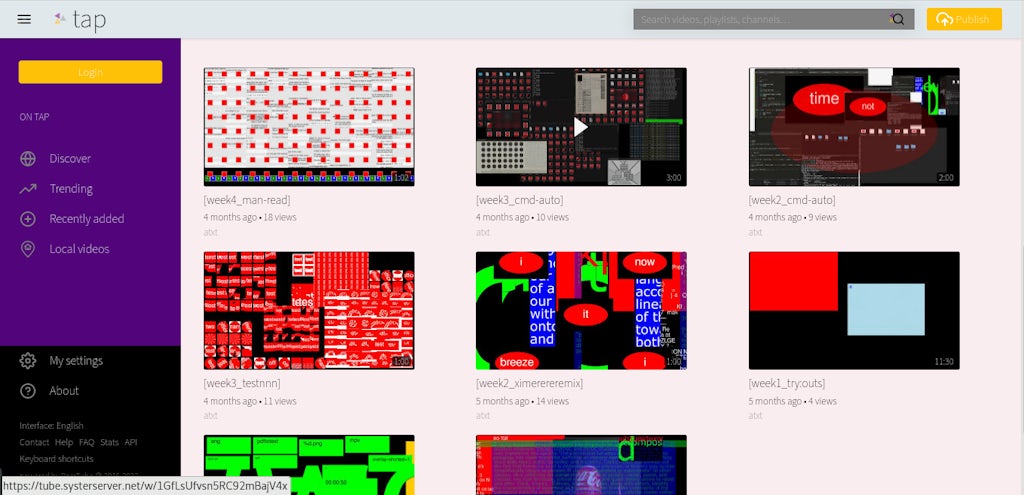
Broken House is centered around sex positivity, video production/archiving and issues of safe spaces and fair body representation. These endeavours naturally bring up a question of underlying systems and tools. To this end, it becomes particularly crucial to run an autonomous platform corresponding to the core undertakings and sensibilities of the community. Video production is central to Broken House and since their material is sensitive [post porn], having control of the video platform and operating it on their own terms is vital to them.
An exclusive and invite-only streaming of a video compilation of Berlin underground porn works, titled “H OUR”, was available to watch on June 25TH, 3PM GLOBAL TIME / 17:00 CENTRAL EUROPEAN TIME and 24 hours onwards. The video was a celebration of underground productions among queers in Berlin. It works as a kickoff for the local Berlin-based initiative to build up an archive of underground [postporn].
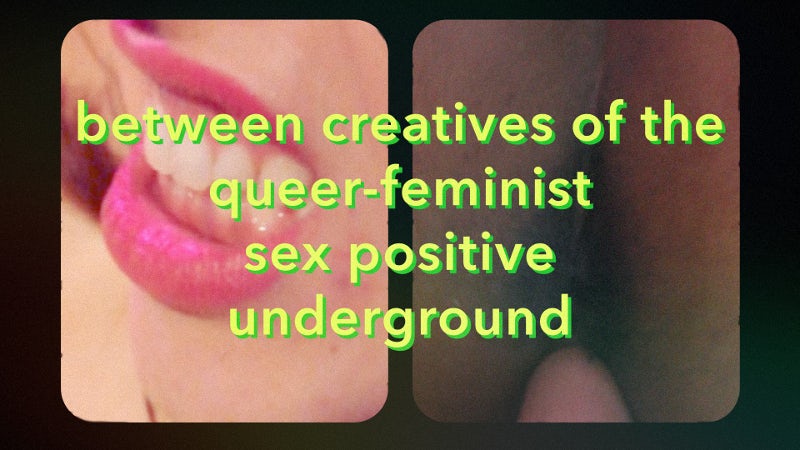
A call to all those who build Feminist Infrastructure. The TransHackFeminist Convergence took place from 1 to 8th August 2022 in Calafou, Catalonia. The THF calls all people building Feminist Infrastructure for a self-organised, face-to-face, body-to-body. It is an informal network of TransHackFeminists located in various parts of the world who are convening this call.
Sessions and workshops were streamed and archived during the THF convergence from 1-8 of August in Calafou, Spain. They are available in the following video channels:
Feminist Hack Meetings (FHM) was a two-day workshop in Athens, 9 and 10 of September 2022, at the space of Eight (https://8athens.wordpress.com/) with the theme Publishing and Toolings.
The worksession is part of ATNOFS: A Traversal Network of Feminist Servers, a project about intersectional, ecofeminist servers happening in 5 cities (Rotterdam, Bucharest, Graz, Athens, Brussels) and organized by local groups (Varia, LURK, HYPHA, ESC, Feminist Hack Meetings and Constant). During the Feminist Hack Meetings in Athens, we would like to meet and connect with feminist local groups, and learn/reflect/imagine together, under a feminist lens, about our interactions with technology as a tool for communicating, publishing, documenting and mapping.
Streaming language is Greek and sequentially translated in English. Streams are archived at the following links:
We lanceerden vier open oproepen voor projectvoorstellen die bijdragen aan een sterk, eerlijk en duurzaam kunstveld. Bekijk de resultaten en ontwikkelingen.
Hoe kunnen we toewerken naar een meer inclusieve, duurzame en solidaire kunstwereld?! Tijdens het A Fair New World?! traject (2020-2022) verzamelden we ideeën, praktijken en instrumenten die mogelijke oplossingen bieden.